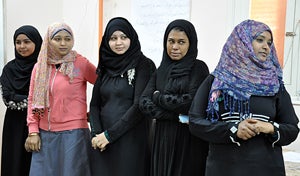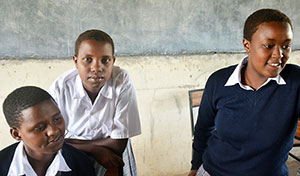The girl child
Girls are among the most vulnerable and most deeply affected by violence. The impacts can span a lifetime. Specific forms of violence and harmful practices, including female genital mutilation (FGM) and cutting, breast ironing and child marriage, affect girls in particular, including sexual violence.
Worldwide, studies reveal that more than 700 million women alive today were married below the age of 18 – and more than one in three (some 250 million) were married before 15.
UN Women works to empower girls and women youth to confront and prevent violence of all kinds. We raise awareness of girls’ rights, run programmes that work with educators, parents and fathers in particular, and with religious leaders to ensure that cultural rites and practices that violate girls’ rights are not misinterpreted. And we advocate with governments and other partners to advance girls' education, health and well-being in order to attain a world where girls can live free from fear, violence and discrimination.
Through film and life, rural women address poverty and early marriage in Egypt
With skills learned from a documentary production workshop co-led by UN Women, a rural woman from Al Tod, Egypt tells the story of how early marriage and poverty have affected the life of a 15-year-old woman in her community, who is now divorced, uneducated and struggling to make ends meet. To address poverty and provide opportunities to such young girls, UN Women is supporting an agricultural project in Upper Egypt that ensures the recruitment and training of women workers, giving them the ability to provide for themselves.
Escaping the scourge of female genital mutilation in Tanzania
At a Maasai girls' school near the town of Arusha, Tanzania, 86 girls at risk of experiencing female genital mutilation and early marriage are getting a chance to complete their education, thanks to a partnership with UN Women. The girls receive scholarships with full board to ensure they complete a minimum level of education and can be worth more than a dowry to their families. FGM, which occurs most often to women and girls in Africa, is directly linked to early marriage and the end of a girl's education.
What the Beijing Declaration says about The girl child
Read our Beijing+20 In Focus package on The girl child
Go back to UN Women's In Focus compilation on Ending Violence against Women 2014

